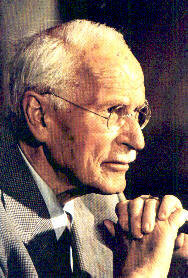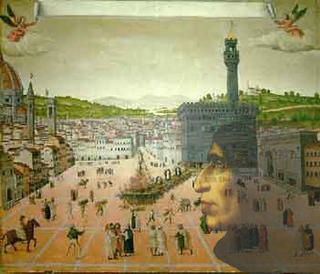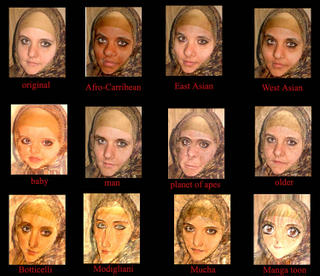One can, of course, take the dhimmi view and see nothing but what one cares to see.
"But I saw it. I was there. It's all the fault of American policies!"
***
August 19, 2005
Al-Fayhaa TV
Interrogator: "What is your full name?"
Abed: "Ramzi Hashem Abed."
Interrogator: "What is your alias?"
Abed: "'Ubeidi."
Interrogator: "Where do you live?"
Abed: "Nabi Yunis in Mosul."
Interrogator: "What organization do you belong to?"
Abed: "Ansar Al-Islam."
Interrogator: "What organization is this?"
Abed: "It is bin Laden's group."
[...]
Abed: "Mullah Al-Shafi'i said that we were going to carry out operations in Najaf."
Interrogator: "What kind of operations?"
Abed: "The Al-Qabanji operation, for example, or sending them poisoning food on the day commemorating the martyrdom of Imam Hussein."
[...]
Interrogator: "Give me an example of an operation."
Abed: "The Turkish embassy, for example."
Interrogator: "The Turkish embassy in Baghdad?"
Abed: "Yes, or the Red Cross. We bombed it. The guys and I bombed it."
Interrogator: "What was the goal of bombing the Turkish embassy or the Red Cross?"
Abed: "By bombing the Turkish embassy, we wanted to cause a problem between the Turkmens and the Kurds."
Interrogator: "In other words, to cause civil strife between the two sides?"
Abed: "Yes."
Interrogator: "As for the murder of Muhammad Baqer Al-Hakim, you were one of the perpetrators, right?"
Abed: "Yes."
Interrogator: "Tell me how it took place."
Abed: "The operation... It was agreed upon right from the start by Mullah Al-Raikan, Mullah Al-Shafi'i, and Al-Zarqawi. They took us Iraqis to do surveillance from a distance. There were people there who specialized in bombing operations. They are still in Baghdad and Mosul."
Interrogator: "How many were you?"
Abed: "About four or five people."
Interrogator: "Those who carried out the operation?"
Abed: "Yes."
Interrogator: "They sent an ambulance and used remote control."
Abed: "Yes."
Interrogator: "Where were you exactly at the time of the incident?"
Abed: "We were in the cemetery."
Interrogator: "Why weren't you close to the incident?"
Abed: "Because there were specialists who carried out the operation."
Interrogator: "Specialists? Who were they?"
Abed: "Abu Sajjad, Abu Haidar, and Abu Hamza."
Interrogator: "All these are aliases. What are their real names?"
Abed: "They never give out their real names."
Interrogator: "You don't even know their real names?"
Abed: "No. For example, my name is Ramzi, right? They call me Abu Shema', after my daughter."
Interrogator: "Okay. What was your role in this operation?"
Abed: "They brought us to monitor the security forces' movements."
Interrogator: "How did the vehicle enter?"
Abed: "It came in through Sweiliej."
Interrogator: "I mean the city itself, how did it enter Najaf?"
Abed: "It was easy for an ambulance to enter."
[...]
Abed: "They gave Abu Sajjad $4,000."
Interrogator: "And you?"
Abed: "They gave us $400."
Interrogator: "A religious leader gave you $400? Okay. Did the operation target Muhammad Baqer Al-Hakim specifically, or the Al-Imam Ali mosque?"
Abed: "No... The people in charge, Mullah Al-Raikan and Al-Zarqawi, targeted Al-Hakim specifically."
Interrogator: "Why in this specific place? Why would they try to target Muhammad Baqer Al-Hakim near the Al-Imam Ali mosque? It is the mosque of the Emir of believers. Didn't you think of all the innocent people around?"
Abed: 'There were also people from Iraqi military intelligence, from the Fidayin, and the internal security, who were also involved in this operation."
Interrogator: "So Mullah Raikan had ties with the old internal security and military intelligence?"
Abed: "And they are still in Mosul."
Interrogator: "What other operations?"
Abed: "Operations we carried out in Mosul."
Interrogator: "Like what?"
Abed: "Against headquarters in Mosul. The headquarters of Mas'oud..."
Interrogator: "Mas'oud Rajab?"
Abed: "Yes. Against Jalal Talabani. We attacked them on the first day of Ramadan 2003."
Interrogator: "What squad did you tell me you belong to? Abu Sajjad's?"
Abed: "Yes."
Interrogator: "The groups you mentioned... Each group had a special mission?"
Abed: "Each group had suicide bombers, who are Afghans, not Iraqis."
[...]
Interrogator: "There were murders of police and National Guard officers."
Abed: "Yes."
Interrogator: "Slaughtering National Guardsmen and policemen – tell me about it."
Abed: "Sir, the slaughtering was done by people who belonged to the Syrians."
Interrogator: "Syrians?"
Abed: "Yes, the slaughtering..."
Interrogator: "From your own group?"
Abed: "No. There was a squad that came from the Syrian border."
[...]
Abed: "We carried out an operation in Mosul. We attacked the Islamic movement."
Interrogator: "The Islamic movement party?"
Abed: "Yes. This was in Mosul. We also hit the Al-Hisk headquarters."
Interrogator: "What is Al-Hisk?"
Abed: "It is the Kurdish neighborhood. We hit them, and we also hit the Communist headquarters, in Mosul."
Interrogator: "The Communist party in Al-Mosul?"
Abed: "Yes."
Interrogator: "Why did you mainly target Kurds?"
Abed: "Because in 2000-2003, Jalal Talabani brought the Americans to attack us."
Interrogator: "You mean that this was just revenge, or did you want to cause strife between Arabs and Kurds?"
Abed: "No, it was revenge."
[...]
Interrogator: "Did you kidnap women?"
Abed: "Yes."
Interrogator: "There were operations of kidnapping and rape, carried out by the squad you belong to?"
Abed: "Yes."
Interrogator: "Tell me how many rape and kidnapping operations were carried out. My information says that the kidnapped women were university students or daughters of famous people. You raped them and got money for it, and if they were not slaughtered afterwards.... Did this really happen?"
Abed: "Yes, it did."
Interrogator: "Who would carry out these operations?"
Abed: "Abu Sajjad."
Interrogator: "Your superior?"
Abed: "Yes."
[...]
Interrogator: "Is this Jihad – raping women? Is this Jihad?"
Abed: "It is because they collaborated with the Americans."
Interrogator: "That's why they were raped?"
Abed: "Yes."
Interrogator: "A student who is simply going to her university is kidnapped, raped, and then slaughtered?! This was an American collaborator?!"
Abed: "Mullah Al-Raikan would give the names to the squad commander."
Interrogator: "My information says that they were kidnapped and brought to Mullah Al-Raikan's headquarters. True or false?"
Abed: "He would interrogate them."
Interrogator: "Were they raped after the interrogation?"
Abed: "Yes. He would give them to the squad, and they would kill them. Some would rape them."
Interrogator: "You bastards. This is Jihad? You call this Jihad? "
Interrogator 2: "What was your role in these operations?"
Abed: "I would stand at the entrance to the headquarters. It was a house, and they would bring them there."
Interrogator 2: "Did you participate in the rape and murder?"
Abed: "No. Just one who worked for the PUK. She was a Kurd."
Interrogator: "In the Patriotic Union of Kurdistan?"
Abed: "Yes. We brought her too."
Interrogator: "And you raped her?"
Abed: "Yes."
[...]
Abed: "Our Ansar Al-Islam military camps were in Halabja."
Interrogator: "This was in the days of the previous regime?"
Abed: "Yes."
Interrogator: "And now?"
Abed: "Now, there is nothing. They were all scattered. The training area was in Falluja."
Interrogator: "And then?"
Abed: "After Falluja was hit, they would come through Syria to Mosul... I mean, through Falluja to Mosul. "
[...]
Abed: "I want to say one thing. Lieutenant Muhammad respected me and gave me food. I never thought it would be like this. He gave me food, and we had lunch together, and the honorable lieutenant-colonel gave me some Pepsi. I never believed Shiites could show such respect and care. We were taught by people like Mullah Al-Raikan that Shi'a is not Islam."
Interrogator: "You mean we show you respect and you slaughter us?"
Abed: "Yes. Mullah Al-Raikan thinks so, and he said so more than once."
Interrogator: "That's what they think."
Abed: "Yes, that Shiites are not Muslims, that they worship the Imam Ali and do not accept Muhammad."
[...]
Al-Iraqiya TV
Interrogator: "Did you rape anyone?"
Abed: "Only one woman, a relative of mine."
Interrogator: "A relative of yours. You kidnapped her and raped her?"
Abed: "No, we did not kill her."
Interrogator: "You didn't kill her, only raped her?"
Abed: "Yes."
Interrogator: "You have some nerve..."
[...]
Abed: "I want to say one thing. Before the operation they would give us pills."
Interrogator: "Capsules?"
Abed: "Not capsules. They would give us something like hashish and opium, and tell us we would not feel the operation we were carrying out."
Interrogator: "Drugs?"
Abed: "Yes."http://www.memri.org







